In modern security operations, integrating alerts and case data across platforms is essential for building a cohesive and responsive threat detection ecosystem. Google SecOps offers several methods to export alerts and cases to third-party SIEMs or SecOps platforms. Among the most preferred approaches is using the Chronicle REST API, which provides robust and flexible access to security telemetry.
However, in a recent implementation, I explored an alternative method that leverages Google Cloud Storage (GCS) to get alerts from one organization to another—particularly useful when SecOps is hosted in a separate Google Cloud organization.
Step 1: Configure Google Cloud Storage Integration in SecOps
Google SecOps simplifies this setup through its Response Integrations. Under the integration named Google Cloud Storage, you’ll need to configure:
- API Root:
https://storage.googleapis.com - Service Account: Full JSON content of the service account with appropriate permissions
- Project ID: The GCP project where the target bucket is hosted
This configuration allows SecOps to interact with the bucket as a destination for alert data.
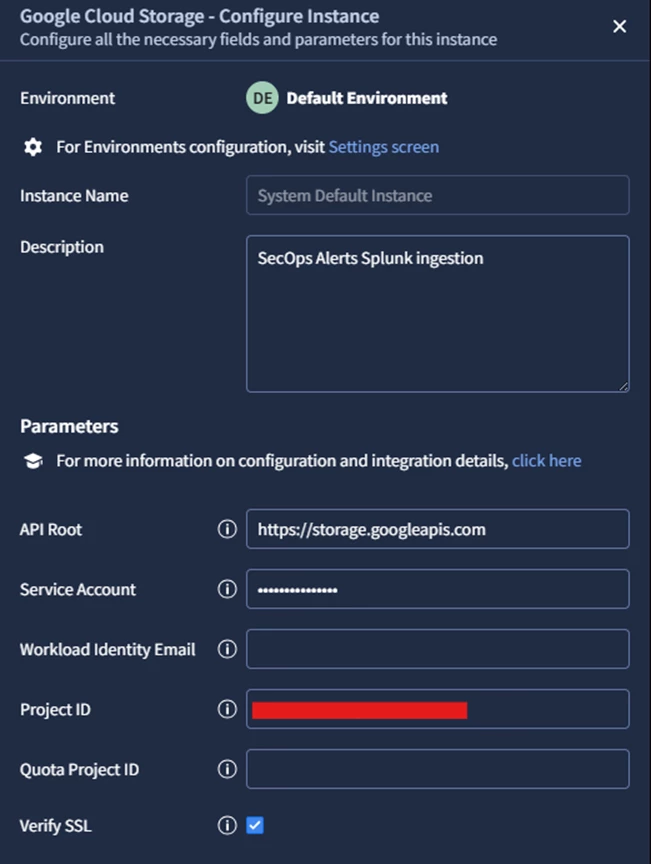
Step 2: Create a SOAR Playbook to Push Alerts to GCS
Once the integration is in place, the next step is to automate the alert ingestion using a playbook:
- Navigate to:
SecOps → Response → Playbooks - Create a New Playbook
- Add a Trigger:
- Choose "Alert Type"
- Set condition to match your alert of interest (e.g.,
"replacement of existing compute disk")
- Add an Action:
- Select "Get Case Data" from the Tools section to retrieve the alert's JSON payload
- Upload to Bucket:
- Use the action "Upload an Object to a Bucket" from the GoogleCloudStorage integration

Challenge: Source File Path Requirement
At this point, a blocker arises—the default upload action requires a local file path, which is not available since it's the local path of the script execution. To overcome this, I customized the “Upload object to GCP Storage” action using IDE and Python.
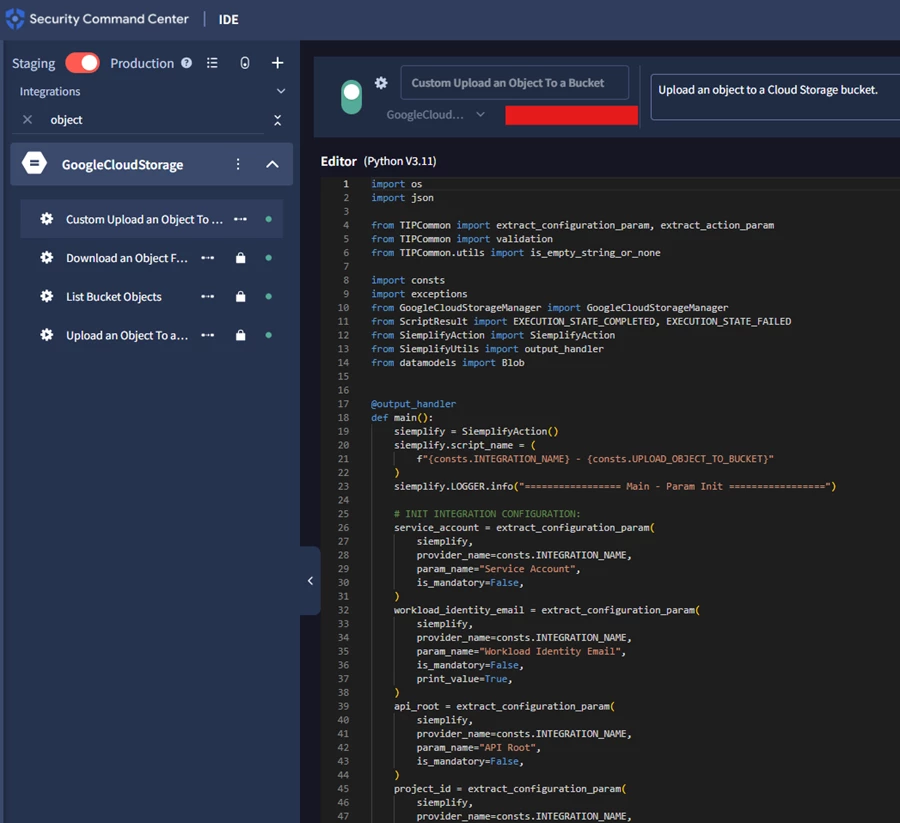
Step 3: Custom Python Action to Upload JSON Directly
Using the secops-wrapper and modifying the upload logic, I created a custom action that accepts JSON content directly instead of a file path.
Here’s a snippet of the modified Python code:
import os
import json
from TIPCommon import extract_configuration_param, extract_action_param
from TIPCommon import validation
from TIPCommon.utils import is_empty_string_or_none
import consts
import exceptions
from GoogleCloudStorageManager import GoogleCloudStorageManager
from ScriptResult import EXECUTION_STATE_COMPLETED, EXECUTION_STATE_FAILED
from SiemplifyAction import SiemplifyAction
from SiemplifyUtils import output_handler
from datamodels import Blob
@output_handler
def main():
siemplify = SiemplifyAction()
siemplify.script_name = (
f"{consts.INTEGRATION_NAME} - {consts.UPLOAD_OBJECT_TO_BUCKET}"
)
siemplify.LOGGER.info("================= Main - Param Init =================")
# INIT INTEGRATION CONFIGURATION:
service_account = extract_configuration_param(
siemplify,
provider_name=consts.INTEGRATION_NAME,
param_name="Service Account",
is_mandatory=False,
)
workload_identity_email = extract_configuration_param(
siemplify,
provider_name=consts.INTEGRATION_NAME,
param_name="Workload Identity Email",
is_mandatory=False,
print_value=True,
)
api_root = extract_configuration_param(
siemplify,
provider_name=consts.INTEGRATION_NAME,
param_name="API Root",
is_mandatory=False,
)
project_id = extract_configuration_param(
siemplify,
provider_name=consts.INTEGRATION_NAME,
param_name="Project ID",
is_mandatory=False,
print_value=True,
)
quota_project_id = extract_configuration_param(
siemplify,
provider_name=consts.INTEGRATION_NAME,
param_name="Quota Project ID",
is_mandatory=False,
print_value=True,
)
verify_ssl = extract_configuration_param(
siemplify,
provider_name=consts.INTEGRATION_NAME,
param_name="Verify SSL",
input_type=bool,
print_value=True,
)
bucket_name = extract_action_param(
siemplify,
param_name="Bucket Name",
is_mandatory=True,
print_value=True,
input_type=str,
)
object_name = extract_action_param(
siemplify,
param_name="Object Name",
is_mandatory=True,
print_value=True,
input_type=str,
)
# REPLACED: This now expects the JSON content directly as a string.
json_content = extract_action_param(
siemplify,
param_name="JSON Content",
is_mandatory=True,
print_value=False, # Set to False to avoid logging sensitive data
input_type=str,
)
siemplify.LOGGER.info("----------------- Main - Started -----------------")
result_value = False
status = EXECUTION_STATE_COMPLETED
try:
validator = validation.ParameterValidator(siemplify)
if not is_empty_string_or_none(service_account):
service_account = validator.validate_json(
param_name="Service Account",
json_string=service_account,
print_value=False,
)
if not is_empty_string_or_none(workload_identity_email):
workload_identity_email = validator.validate_email(
param_name="Workload Identity Email",
email=workload_identity_email,
print_value=True,
)
manager = GoogleCloudStorageManager(
service_account=service_account,
workload_identity_email=workload_identity_email,
api_root=api_root,
project_id=project_id,
quota_project_id=quota_project_id,
verify_ssl=verify_ssl,
logger=siemplify.logger,
)
try:
siemplify.LOGGER.info(
f"Fetching bucket with name {bucket_name} from "
f"{consts.INTEGRATION_DISPLAY_NAME}"
)
bucket = manager.get_bucket(bucket_name=bucket_name)
siemplify.LOGGER.info(
f"Successfully fetched bucket from with name {bucket_name} from "
f"{consts.INTEGRATION_DISPLAY_NAME}"
)
except (
exceptions.GoogleCloudStorageNotFoundError,
exceptions.GoogleCloudStorageForbiddenError,
exceptions.GoogleCloudStorageBadRequestError,
) as exc:
raise exceptions.GoogleCloudStorageNotFoundError(
f"Bucket {bucket_name} Not found."
) from exc
bucket_google_obj = bucket.bucket_data
blob = bucket_google_obj.blob(object_name)
siemplify.LOGGER.info(f"Uploading JSON content to '{object_name}'")
# MODIFIED: Uploading the JSON string directly.
# The .upload_from_string() method is part of the google-cloud-storage library
# and is ideal for this use case.
blob.upload_from_string(json_content, content_type='application/json')
siemplify.LOGGER.info(
f"Successfully uploaded JSON content to '{object_name}'"
)
blob.reload()
created_blob = Blob(
id=blob.id, name=blob.name, md5_hash=blob.md5_hash, object_path=blob.path
)
siemplify.result.add_result_json(created_blob.as_json())
result_value = True
output_message = (
f"Successfully uploaded JSON content to bucket: {bucket_name} "
f"as object: {object_name}"
)
except (
exceptions.GoogleCloudStorageNotFoundError,
exceptions.GoogleCloudStorageValidationException,
) as error:
output_message = (
f"Action wasn't able to upload JSON content to "
f"{consts.INTEGRATION_DISPLAY_NAME}. Reason: {error}"
)
siemplify.LOGGER.error(
f"Action wasn't able to upload '{object_name}' to "
f"{consts.INTEGRATION_DISPLAY_NAME}. Reason: {error}"
)
siemplify.LOGGER.exception(error)
except Exception as error:
status = EXECUTION_STATE_FAILED
output_message = f"Error executing action '{consts.UPLOAD_OBJECT_TO_BUCKET}'. Reason: {error}"
siemplify.LOGGER.error(output_message)
siemplify.LOGGER.exception(error)
siemplify.LOGGER.info("----------------- Main - Finished -----------------")
siemplify.LOGGER.info(f"Status: {status}:")
siemplify.LOGGER.info(f"Result Value: {result_value}")
siemplify.LOGGER.info(f"Output Message: {output_message}")
siemplify.end(output_message, result_value, status)
if __name__ == "__main__":
main()
In the playbook, I replaced the "Source File Path" field with "JSON Content", and passed [Get Case Data.JsonResult] as the value.
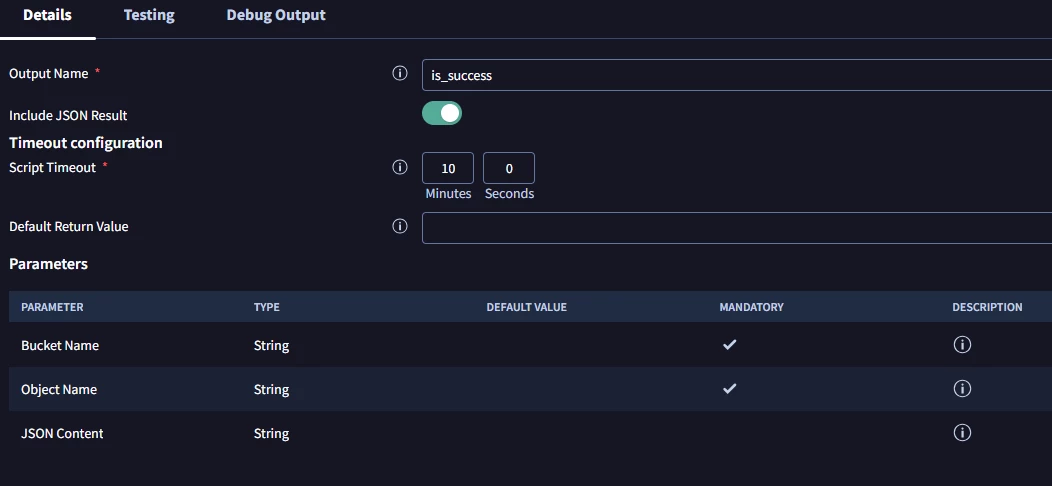
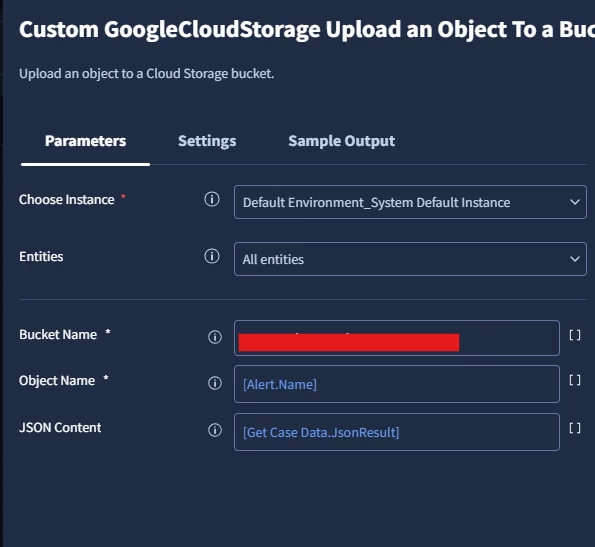
Final Step: Test and Validate
After saving the playbook and running a simulation, the alert was successfully pushed to the GCS bucket as an object. If you encounter errors, ensure:
- The service account has Storage Admin permissions
- VPC peering is correctly configured between organizations
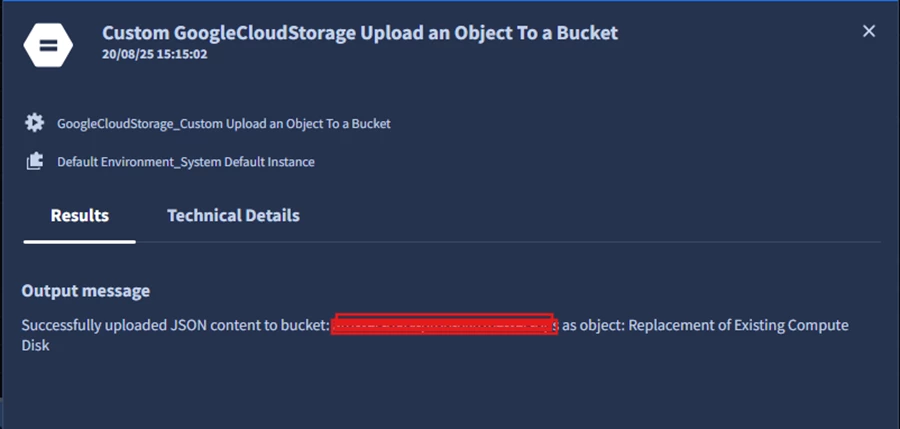
Conclusion
This approach offers a flexible and scalable way to ingest Google SecOps alerts into external systems, especially when dealing with multi-org setups. By customizing the SOAR playbook and bypassing local file dependencies, you can streamline alert ingestion and enhance cross-platform visibility


